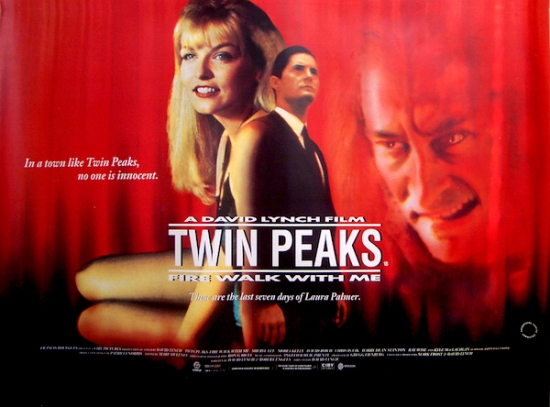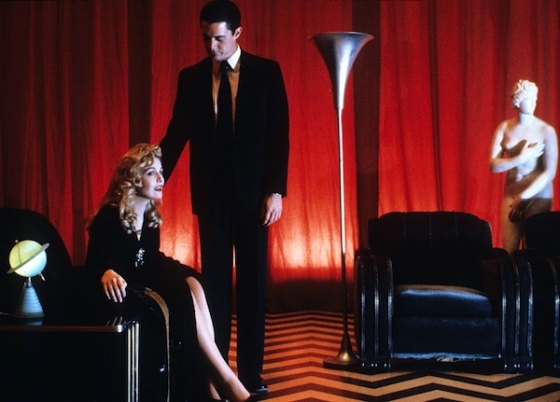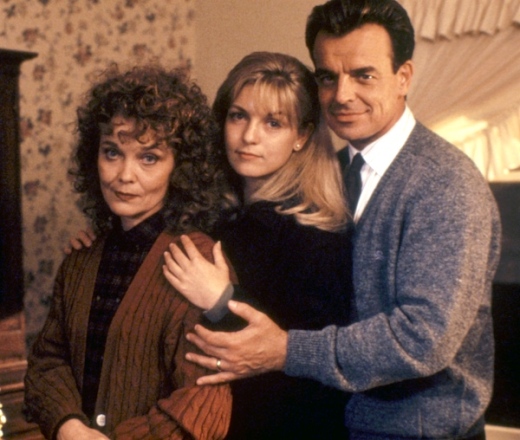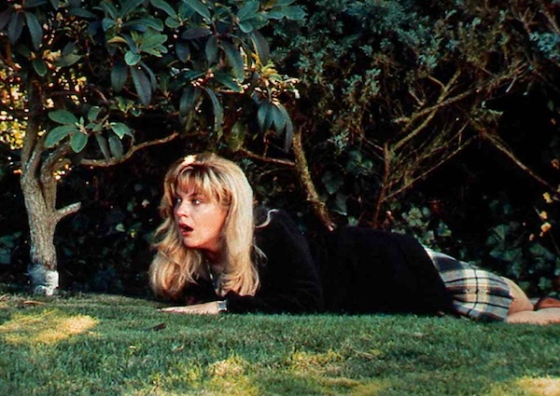David Lynch | 135 mins | Blu-ray | 1.85:1 | USA & France / English | 15 / R

When Twin Peaks was cancelled, co-creator David Lynch quickly realised he wasn’t done telling stories in that world — probably because he’d just ended the TV series on a massive cliffhanger, having only recently refocused his attention on the show after a period of absence. Within a month of the series’ end, he’d secured a deal to produce a big-screen continuation. Along with one of the series’ lead writers, Robert Engels, Lynch cooked up a plan for a trilogy of movies that would explore some of the series’ leftover mythology — primarily, the mysterious and otherworldly Black Lodge. The first of these movies would begin by revisiting the aspect of Twin Peaks that had brought it so much attention in the first place: the murder of Laura Palmer.
Unfortunately, Lynch had misjudged the public’s appetite — or, more likely, didn’t particularly care about that, but nonetheless what people wanted didn’t line up with what Lynch made. The resulting movie, Twin Peaks: Fire Walk with Me, was not a success. For fans of the TV programme, the tone didn’t match, most of the regular cast didn’t appear, and, on the surface at least, it was a story about events they already knew, rather than a resolution to the series’ cliffhanger. For non-fans, it didn’t seem to stand alone in the way a ‘proper’ movie should. Lynch had won the top prize at Cannes just two years earlier, but now the screening of Fire Walk with Me was booed; so was the press conference. Reviewers were similarly unimpressed. The film flopped at the box office. The intended trilogy stalled with its first instalment, and Fire Walk with Me went down as a poorly-regarded failure, unquestionably one of Lynch’s worst films.

Well, opinions change. Nowadays you’re just as likely to see someone contend that Fire Walk with Me is the pinnacle of Lynch’s career as you are to see someone express the view it’s his nadir; perhaps even more likely. From what I can gather, a quarter-of-a-century’s distance has allowed people to become more understanding about what it was Lynch was actually trying to achieve with the film; that it is, despite what the title might lead you to believe, as much “A David Lynch Film” as it is “A Continuation of The Popular Mainstream TV Series Twin Peaks”.
In both of these respects, there’s an awful lot to unpack. It’s a continuation and expansion of the ongoing Peaks story (and certainly not a conclusion to it), with pieces that lead up to Laura’s murder, pieces that expand on or continue stuff from the series finale, as well as brand new mysteries and puzzles. Simultaneously, it stands on its own two feet as a depiction of — and, in its use of horror, allegory for — the terrors of domestic psychological abuse and incest. And before all that it starts with a half-hour prologue in which a cast of character we mostly don’t know investigate a murder that die-hard fans might just about recall from its fleeting relevance to the series’ earliest episodes. And David Bowie turns up for a bizarre cameo that goes nowhere. In many respects, Fire Walk with Me is not an easy movie.
It is a rewarding one for those prepared to dig into it, however. Again, that applies to both levels the film is functioning on. It may not directly continue after the events of the series, but there are a couple of hints and nods towards the events of the finale and what happens next, as well as a lot of general additions to the mythology. And as a film about abuse, it’s not just a depiction of events, but is attempting to in tap into how that actually feels, psychologically — as Lynch has said, it’s about “the loneliness, shame, guilt, confusion and devastation of the victim of incest.” It must do this successfully because Sheryl Lee has said that, “I have had many people, victims of incest, approach me since the film was released, so glad that it had been made because it helped them to release a lot.” Bravely, it’s also a bit about the abuser, presenting him with, if not sympathy, then some degree of understanding — to quote Lynch again, it deals with “the torment of the father – the war within him.”

One thing that straddles both sides of the film, I think, is that it goes a long way to ‘redeeming’ Laura Palmer. In the series she’s the all-American good girl homecoming queen who we quickly learn wasn’t so good under the surface, spending her time partying hard with drugs and promiscuous sex. At one point it seems like she was just a wild child who got in too deep. Now, I forget if the series eventually made clear that she let herself be murdered in order to stop a malicious demon from possessing her, but, even if it did, it’s a few lines of dialogue. Here, we see the real, severe struggles she was battling while trying to maintain some kind of normal life, and how hard she fought against them. She was, actually, just an ordinary girl, forced to face extraordinary circumstances.
Conversely, this is almost exactly why some people disliked the film: because it took how Laura Palmer appeared in the series, as kind of a notion or concept that the town projected their values and issues onto, and made her into a real person, who was consequently as messed up as most teenagers are. Essentially: Laura Palmer was more interesting dead than alive. I have two thoughts on this. One: Laura wasn’t exactly leading a normal life, so there’s definitely something in seeing how she ended up how she did; what her psychological state was like. Two: perhaps it’s entirely the point that the reality and the legend (particularly the legend built around someone tragically cut down too young) are not the same thing; that the reality is not as great as the notion. That sounds like a particularly Lynchian theme to me.
All of this added depth to Laura is driven by a remarkable performance from Sheryl Lee. Originally cast to play a corpse and a photograph, Lynch liked her so much they created a role for her in the series (as Laura’s lookalike cousin Maddie), and she gets an even meatier role here. Even though viewers of the series already know the answers that Laura only discovers during the film, Lee’s performance is so powerful, particularly when enacting fear or terror (no one instils fear in the viewer quite so well as Sheryl Lee looking terrified by something off camera that we never see), that we are horrified along with her. There’s also a power in seeing something play out that we’ve previously only been told about — the reality of it happening is more horrendous than the facts we’ve heard.

This is partly why Fire Walk with Me has a distinctly different tone to the series (which, as noted, probably didn’t help win people over). It’s still full of quirky surrealism, of course, because it’s a David Lynch film; but the lighter, funnier, chirpier elements have all been excised. This is a dark, dark movie. One suggestion I’ve read from a fan is that the TV series was from Agent Cooper’s point of view, hence it emphasised the small-town charm and optimistic worldview, while the film is from Laura’s perspective, so it’s altogether grimmer and more fatalistic. This may not have been deliberate on the part of Lynch and co, but it certainly makes some kind of sense.
Which road the imminent Twin Peaks revival will walk, obviously no one outside of the production yet knows. But the other week it was widely reported that Lynch had said Fire Walk with Me would be essential to understanding the new series. I think some people were surprised by this — the vestiges of the film’s original negative reception, perhaps — but, having just watched the film, it feels like a bit of a “well, duh” statement. Fire Walk with Me is often summarised as being just “the last seven days of Laura Palmer”, which makes it sound like it’s wholly related to a mystery that was wrapped up in the original series. It’s more than that, making huge contributions to the series’ ongoing mythos, as well as a couple of hints about events in and after the original finale — unless those were going to be completely ignored by the new series (which doesn’t sound like Lynch to me, not to mention that it would surely irritate fans), then of course Fire Walk with Me is important!
One thing that’s probably never getting explained is that Bowie cameo. His character was one of the things inserted by Lynch and Engels to build on in the proposed sequels — yes, rather like all those films that adapt the first novel of a series and fill it with foreshadowing, assuming they’ll get to make the rest, but never do. Reportedly Bowie was lined up to appear in the revival, but died before he could film any scenes. Whether that particular mystery will be explained some other way, or be left forever as a dangling thread in Twin Peaks’ complex web, obviously remains to be seen. So too the disappearance of Agent Chester Desmond, as actor Chris Isaak isn’t part of the extensive cast list they’ve announced. But then, maybe they’re keeping some secrets there too…

There’s so much more that could be said about Fire Walk with Me. About ‘fake Donna’, for instance — actress Moira Kelly standing in as Laura’s best friend, Donna Hayward, because original actress Lara Flynn Boyle was unavailable — and how there’s a camp of people who think she might actually be better than the original (me included). About the significance of time (there’s a definite clock motif; several clear references in dialogue; it’s technically a prequel but with sequel pieces; there’s definitely a few bits of time travel going on; and so on). About the Lil scene, which may or may not be a dig at over-analytical fans; indeed, that whole prologue is like some kind of inversion of Twin Peaks. About the Pink Room sequence and its seedy artistry. About the interpretation that Bob is a shared fiction, concocted by both Leland and Laura to help that pair of troubled souls deal with the horrors they’re living through (you may think Leland deserves no sympathy, but the series made it fairly clear that he had been a victim of abuse himself…)
Fire Walk with Me is so many different things all at once that it’s almost a mess of a film. But Lynch knows what he’s doing, if not entirely then at least to a significant degree. Plus it only becomes more interesting and complex as you continue to think and read about it after viewing. Perhaps, after the new series, it will slot into place even better, and its significance in the overall scheme of Twin Peaks will become even clearer. Maybe its critical rehabilitation has a few steps left to take yet…

Tomorrow: the missing pieces.
